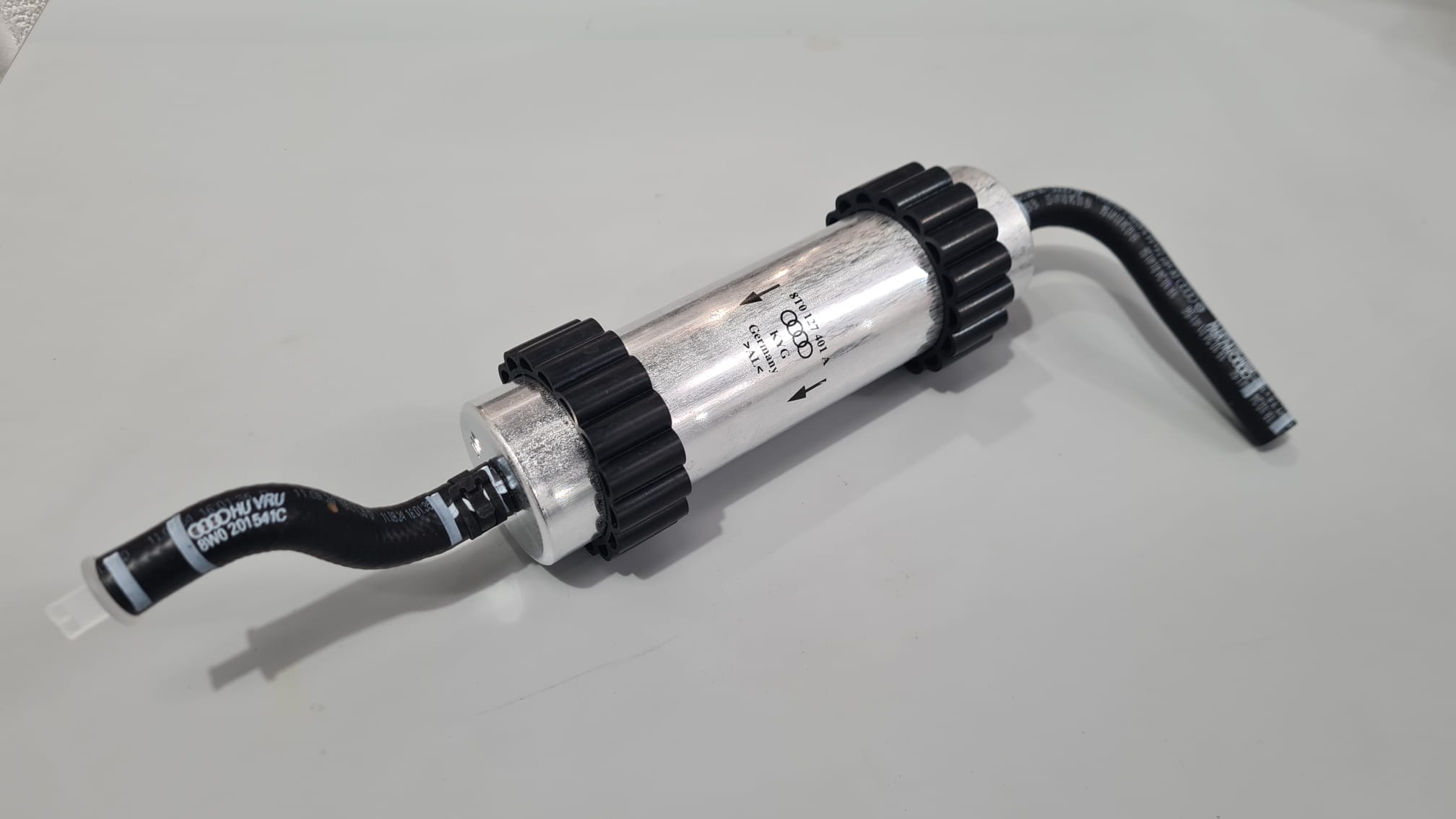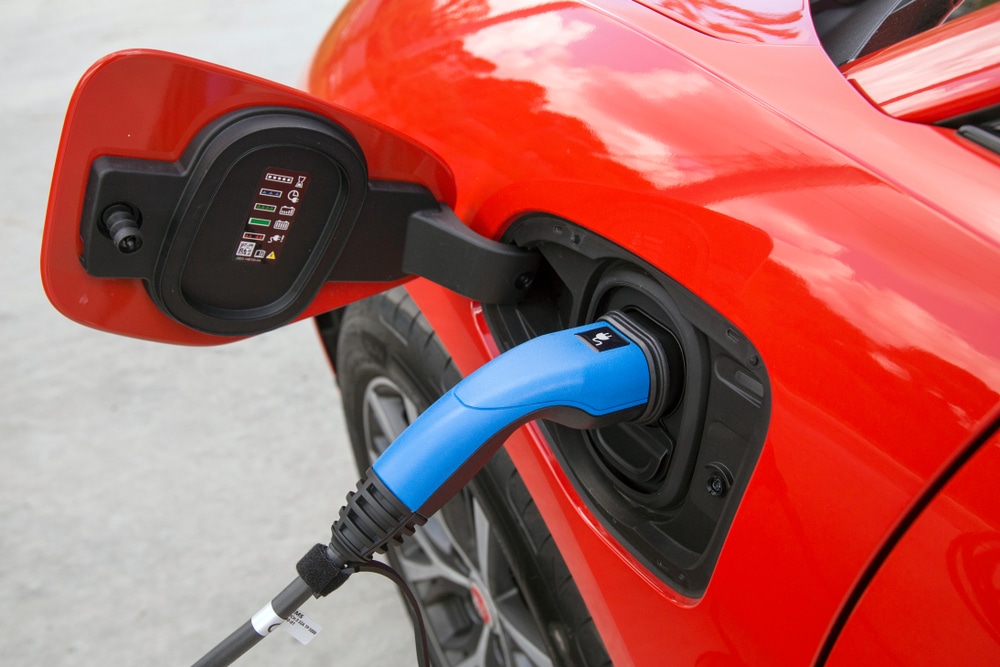Diesel Fuel Filter
Could a part as small as a fuel filter stand between smooth running and a major breakdown?
Your vehicle’s diesel fuel filter quietly protects your fuel system from particles and water in the fuel. Neglecting servicing can increase the risk of costly faults and poor performance.
Which is the last thing you need for your car.
Throughout this guide, you’ll uncover where the diesel fuel filter is located, how it works, the problems that can appear when servicing is missed, and why regular diesel fuel filter replacement is vital.
Not sure when your diesel filter was last changed?
Call Ystrad Service Centre, Ystrad Mynach, today on 01443 540460 to book your service.
Where the diesel fuel filter sits
Your diesel fuel filter (part 4 in the diagram) is often located on the low-pressure side of the fuel system, between the tank and the high-pressure pump.
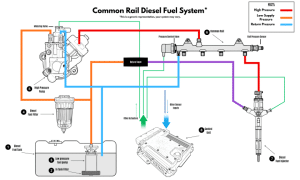
In most modern vehicles, you’ll find it positioned in the engine bay for easier access during servicing.
Many diesel models also include a coarse strainer inside the tank (part 2), which helps catch larger debris before it reaches the main diesel fuel filter.
To understand how this fits into the overall fuel system, take a look at our Diesel Fuel System Guide.
How your diesel fuel filter works
The diesel fuel filter plays a critical role in safeguarding the system. Here are the two main ways in which it works:
- Filtering particles: The diesel fuel filter’s job is to trap debris and other contaminants before they can damage injectors or the high-pressure pump. Without it, wear, blockages, and system faults are far more likely.
- Separating water: Diesel fuel naturally contains small amounts of water. Your vehicle’s diesel fuel filter removes this moisture before it passes through the system, preventing corrosion and costly damage.
Your diesel fuel filter is one of the main barriers against fuel system damage. This is why regular maintenance is required. Failing to keep up with your vehicle’s servicing can result in costly repairs.
Keep your diesel fuel system in good working condition by booking your servicing with Ystrad Service Centre, Ystrad Mynach, today at 01443 540460.
How diesel fuel filters are designed
Modern diesel vehicles typically use a fine filter module (part 4 in the diagram), though the design can differ. The main versions are:
- Sealed filter units: These sealed canisters are replaced in their entirety, housing and media together. They’re more often seen in older or heavy-duty vehicles, sometimes with built-in drain bowls or water separation.
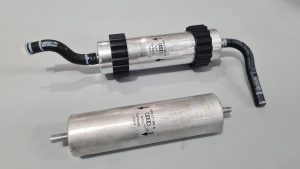
- Cartridge modules: This common diesel fuel filter design uses a fixed housing made of plastic or aluminium that holds a pleated, multi-layer filter element. The housing removes dirt and water and may also feature sensors, valves, or a hand primer. At each service, only the element is changed.
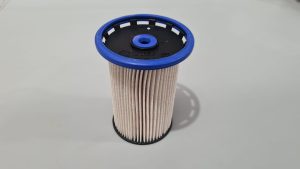
Many modern diesel setups also include a coarse strainer in the tank (part 2 in the diagram), which traps larger debris before it reaches the filter.
Regular diesel fuel filter replacement is an essential part of preventative maintenance, ensuring your fuel system stays in peak condition. Neglecting it could leave you facing costly repairs further down the line.
When was your diesel filter last serviced?
Call Ystrad Service Centre, Ystrad Mynach, today on 01443 540460 to book your diesel service.
Diesel fuel filter issues and their effects
If your diesel fuel filter develops faults, it can lead to the following:
- Blocked strainer: A clogged in-tank strainer makes the lift pump strain harder, often causing noisy operation and an uneven fuel supply.
- Restricted filter: A dirty or blocked diesel fuel filter can reduce diesel flow to the high-pressure pump, leading to poor performance, difficulty starting, or even a no-start.
- Water contamination: If your diesel fuel filter doesn’t separate water, corrosion can damage injectors and the pump, leading to costly failures.
- Incorrect installation: A poor seal or the wrong diesel fuel filter may cause diesel leaks, air ingress, or fuel bypass.
- Air entry: Poor installation or worn seals allow air into the low-pressure side, causing hesitation, stalling, or extended cranking.
It’s worth mentioning that these common problems and symptoms could be caused by another fault, so it’s always worth seeking advice from an expert.
If you need help with your diesel vehicle, call Ystrad Service Centre, Ystrad Mynach, today on 01443 540460 to book your service.
Diesel filter replacement guidance
Diesel fuel filters don’t have a fixed mileage interval. The correct replacement point depends on the schedule set by your vehicle’s manufacturer. This will vary depending on your vehicle’s make and model.
Key reminders:
- Water management: Some diesel fuel filters with drains or sensors should be checked at each service and drained if necessary.
- Correct part & quality: Always use the right filter design. Cheap substitutes risk leaks, restricted flow, or weak water separation.
- Priming is vital: After a diesel fuel filter replacement, your vehicle’s diesel system must be adequately primed using the pumps or a hand primer. Skipping this step may leave air pockets, causing hard starting or even pump damage.
- Declining efficiency: During ISO testing, new diesel fuel filters have been shown to remove over 95% of water, but this can fall to around 70% as the filter nears the end of its service life.
Not sure when yours was last changed? Call Ystrad Service Centre, Ystrad Mynach today on 01443 540460.
Protecting your diesel system
Replacing your diesel fuel filter at the recommended intervals is a vital step in preventative maintenance.
Sticking to the manufacturer’s servicing schedule helps protect against fuel system damage, reducing the chance of breakdowns, and keeps your diesel performing reliably. Looking after your diesel fuel filter now means avoiding larger (and more expensive) issues down the line.
When it comes to properly maintaining your diesel vehicle, choosing the right garage is just as important as following the schedule.
That’s why drivers across Ystrad Mynach and Caerphilly trust the Ystrad Service Centre.
Why drivers choose Ystrad Service Centre
Drivers across Ystrad Mynach and Caerphilly trust our garage because we provide:
- Diesel servicing is carried out by skilled technicians.
- A complete 12-month parts and labour guarantee.
- Courtesy cars are available to keep you mobile.
We’re even backed by a {{average-rating}}⭐ Google rating from {{review-count}} satisfied customers across Cardiff and South Wales.
Keep your diesel fuel system in peak working condition. Book your diesel servicing at Ystrad Service Centre, Ystrad Mynach today on 01443 540460.
Diesel filter FAQs for Ystrad Mynach drivers
- Where is the diesel fuel filter?
You can usually find your diesel fuel filter positioned in the low-pressure line between the tank and the high-pressure pump. On most modern vehicles, it’s in the engine bay. A coarse strainer is often fitted in the tank to block larger debris. - What does a diesel fuel filter do?
It removes particles and water from diesel fuel before they can harm injectors or the high-pressure pump. Without it, blockages, corrosion, and damage can lead to expensive failures. - What are the common symptoms of a blocked diesel filter?
Typical signs of a blocked diesel fuel filter include sluggish performance, hesitation, stalling, or no-start conditions. As other issues can cause these symptoms, expert advice is recommended. - Can a blocked diesel filter damage the pump?
Yes. Reduced flow forces the pump to work harder, which may shorten its life or lead to failure. Replacing the filter costs far less than replacing a pump. - How often should the diesel fuel filter be replaced?
There isn’t a universal mileage or time frame for diesel fuel filter replacement, as it varies by vehicle. The safest approach is to follow the interval set out in your manufacturer’s servicing schedule. Sticking to this guidance ensures your filter is replaced before performance or reliability are affected.
